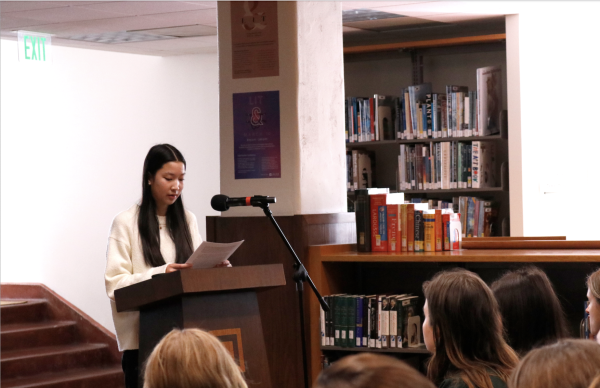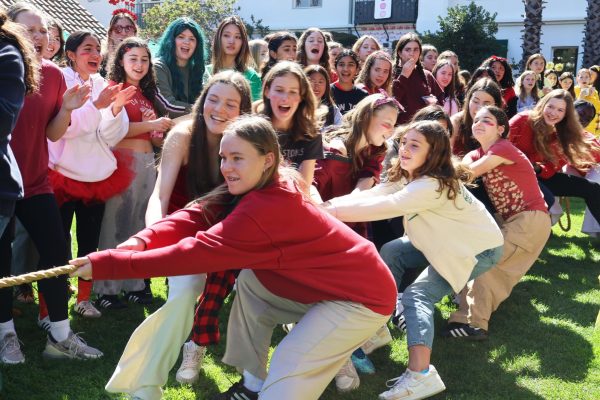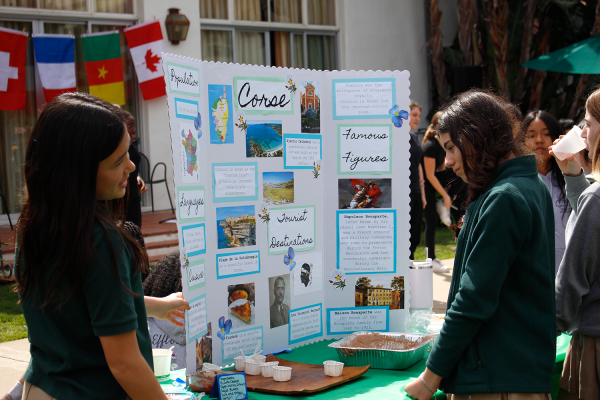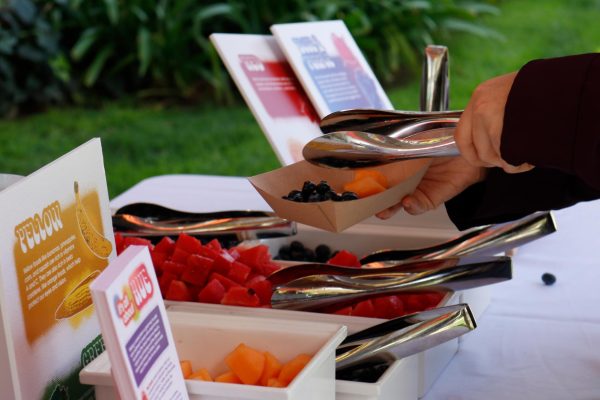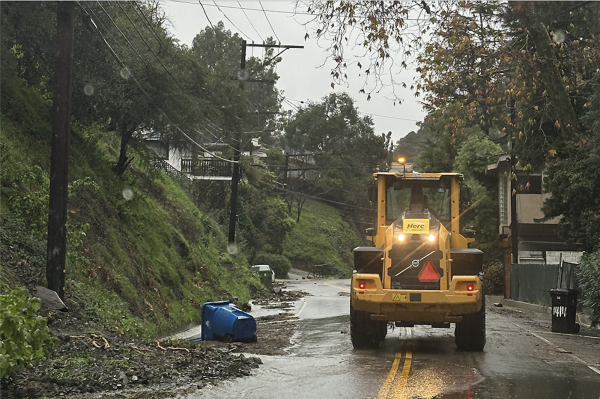Annual Diversity, Equity and Inclusion Conference emphasizes student involvement, explores identity
Photo credit: Jessica Jimenez
While modeling traditional dress during the fashion show, Kaitlyn Kim (’21) laughs on stage as dancers use fans to decorate the stage with color. The fashion show participants modeled different clothing items from countries within Asia.
On the morning of Wednesday, Jan. 29, all members of the Archer community gathered in the courtyard to celebrate the start of the 13th annual Diversity, Equity and Inclusion Conference. According to a campus-wide email, the daylong event’s mission was to “seek to broaden our awareness and understanding of the diverse identities and cultures reflected within local and global communities in the hope of engendering a greater sense of trust and acceptance.”
The conference gave students the opportunity to lead their own workshops on the topic of their choice. Leaders ranged from students to faculty to staff members. With almost 50 student workshop leaders and a group of students on the Diversity Conference Student Leadership Team (DCSLT), students had control over several aspects of the conference.
Senior and DCSLT member Nia Mosby said that each student’s experience was a “priority” for this year’s conference.
“We worked really hard at putting together a conference that could shed light on diversity of experience for individuals. I have heard that past diversity conferences have not been as successful as hoped for, and the DCSLT wants to change that,” Mosby said. “We want to emphasize that this day is a day to learn about other people’s experience. It is not a day to walk in other peoples’ shoes but to recognize the shoes they walk in.”
The day started with student performances of instrumental music, cultural dances and song. From traditional Mexican folk dances by Anny Rodriguez (’22) and Angelica Gonzalez (’20) to African American spirituals performed by Upper School Choir, students learned about traditional artistic expression from several cultures.
“I am glad that Diversity Day provides a space for the dances to be shared with the Archer community,” senior Isabella Sousa-Terraciano said.
Later in the morning, middle school students watched the documentary “Period. End of Sentence.” The DCSLT showed upper school students the film “Documented” by Jose Antonio Vargas, an undocumented Pulitzer-prize winning journalist. The film touched on how Vargas’ immigration status has impacted every aspect of his life, from his career to his relationship with his mother.
Mosby said the reason the DCSLT chose to show the film was because “citizenship privilege is not something that is talked a lot about.”
Mosby expressed “concern” about the way the film would be received by the student body, but the reception was generally positive.
Senior Emma Alperovich called the film “extremely powerful.”
“It was a good way to get the conversation at Archer started about undocumented people and help us realize our privilege,” Alperovich said.
Morado said that the film “resonated” with her because of her personal experience with how immigration impacts families.
“Being the daughter of an immigrant who doesn’t live in the United States,” Morado said, “seeing Jose Antonio Vargas use technology to reconnect with his mom was very relatable.”
For the first time, affinity spaces were implemented in the processing time after the film. Each student was able to go to an “affinity space” with students that identified with the same ethnicity as them.
Freshman Lizette Gonzalez, who went to the Latinx affinity space, touched on her experience processing with an affinity group.
“I really enjoyed it because after watching ‘Documented’ it was important for me to be in my community and talk about it. It was heartbreaking but also heartwarming to see how similar our experiences with immigration were,” Gonzalez said. “I feel that I would not have made as many connections if I were not with my community.”
After lunch, students went to their respective workshops ranging from “Faith vs. Fact: The Unfortunate War Between Science and Religion” to “Socioeconomic Status at Archer.”
Sophomore Andrea Ramirez led a workshop along with the rest of the Hermanas Unidas Executive Board to discuss the ways in which social identifiers affect a person’s everyday life. Ramirez said that one of the challenges of her workshop would be “people being uncomfortable with sharing,” but that she was eager to learn about others’ experiences with social identifiers.
“I am excited to see what different people bring to the workshop and to hear about other peoples’ experiences because everyone has unique experiences,” she said.
With other members of the Muslim & Middle Eastern Culture Club & Alliance (MMECCA) executive board, Senior Ariana Golpa led a workshop about Middle Eastern dance and its prevalence in pop culture.
“I feel like a lot of people at Archer don’t consider Middle Eastern views and beliefs,” Golpa said. “We didn’t have an affiliation club until this year, so we thought it was almost our duty to have a workshop for people to learn even more about our culture.”
Senior Maddie Fenster led an interactive workshop in which students researched and debated positions they may not have agreed with.
“We have a lot of workshops on identity,” Fenster said. “I thought it would be nice to have a more interactive workshop with something like a debate that focuses on something not necessarily identity-based, but just on the topic of political and mental diversity.”
As the conference wound down, students reflected on their day. Reflection options ranged from journaling to participating in a drum circle.
While reflecting on the day, senior Hailey Adams said that her experience was generally positive, but she has constructive criticism.
“I liked that there were other workshops this year that really tried to push the diversity conversation beyond race and gender or politics,” Adams said. “I hope they can add more representation of other diversities and students of color in the Archer community for the future.”
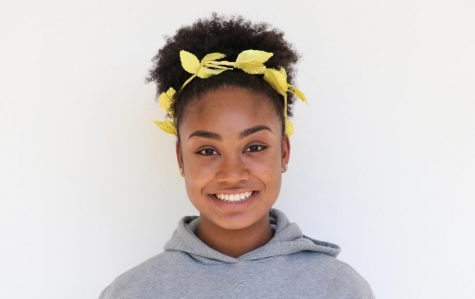
Cydney Johnson joined the Oracle as a staff reporter in 2019. She plays volleyball and she is also a member of Peer Support. During her free time she...
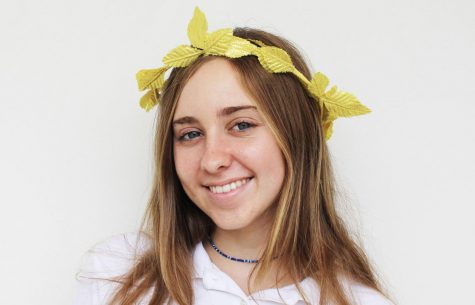
Molly Goldberg joined the Oracle staff in 2017 as a staff writer and was promoted Sports Editor for her junior year. This year, she is excited to fill...
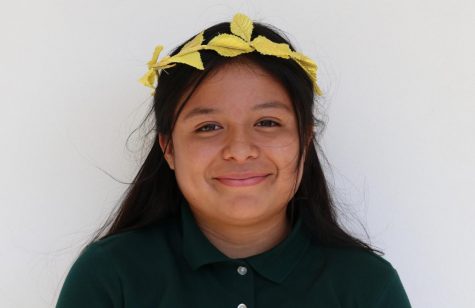
Jessica Jimenez joined the Oracle as a staff reporter in 2019. She enjoys hanging out with her friends and spending time with her family. She also enjoys...





![Freshman Milan Earl and sophomore Lucy Kaplan sit with their grandparents at Archer’s annual Grandparents and Special Friends Day Friday, March 15. The event took place over three 75-minute sessions. “[I hope my grandparents] gain an understanding about what I do, Kaplan said, because I know they ask a lot of questions and can sort of see what I do in school and what the experience is like to be here.](https://archeroracle.org/wp-content/uploads/2024/03/grandparents-day-option-2-1200x800.jpg)













































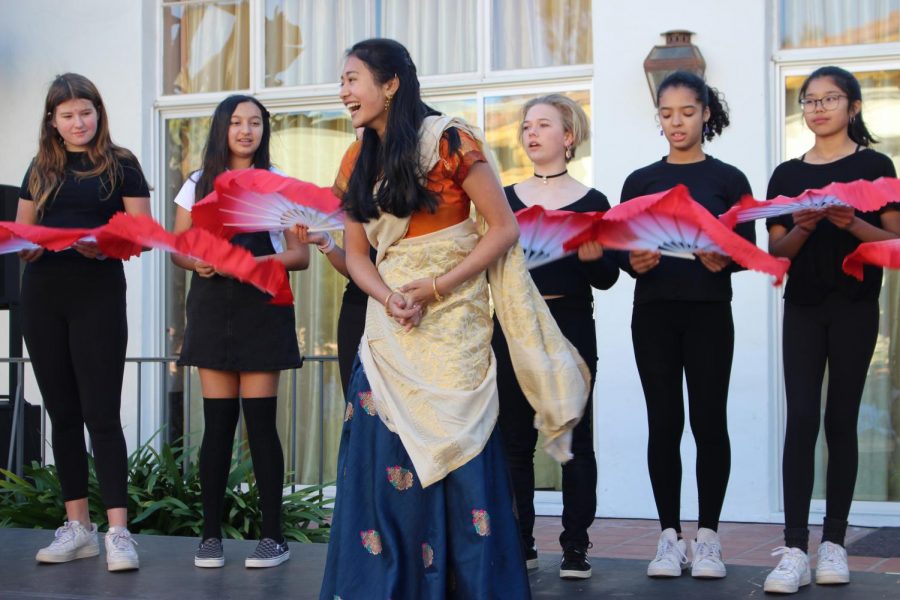

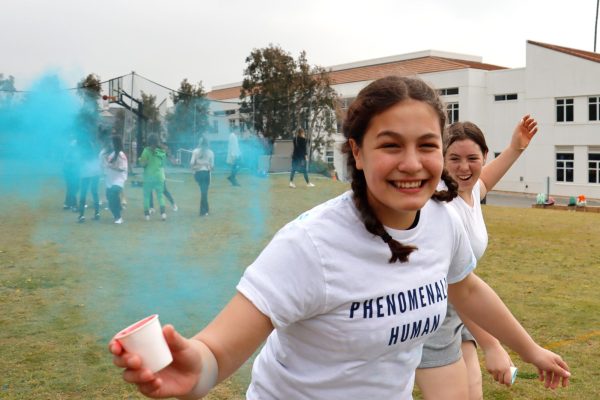
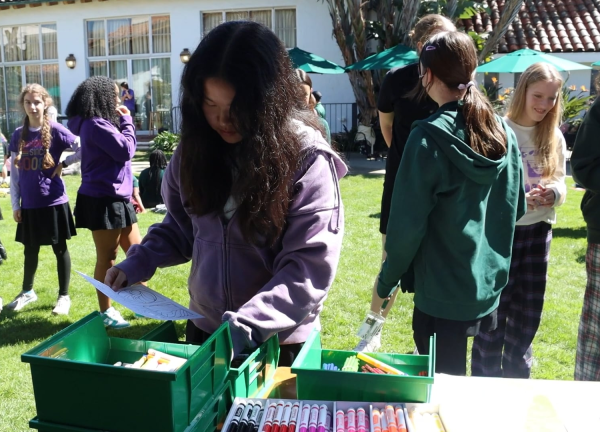
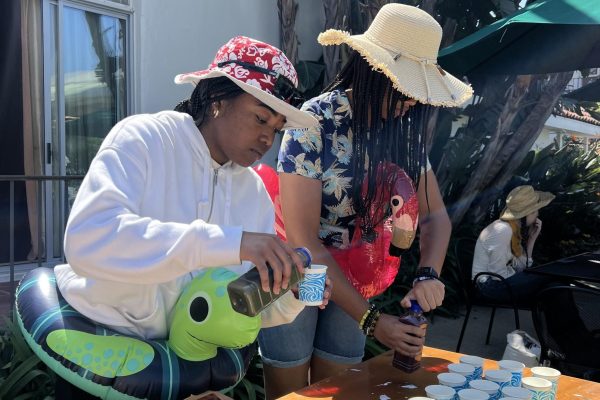
![Freshman Milan Earl and sophomore Lucy Kaplan sit with their grandparents at Archer’s annual Grandparents and Special Friends Day Friday, March 15. The event took place over three 75-minute sessions. “[I hope my grandparents] gain an understanding about what I do, Kaplan said, because I know they ask a lot of questions and can sort of see what I do in school and what the experience is like to be here.](https://archeroracle.org/wp-content/uploads/2024/03/grandparents-day-option-2-600x400.jpg)
